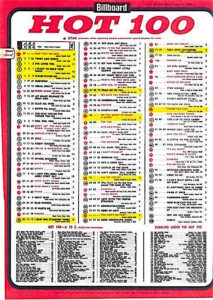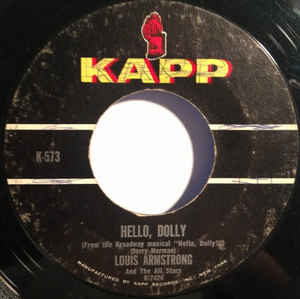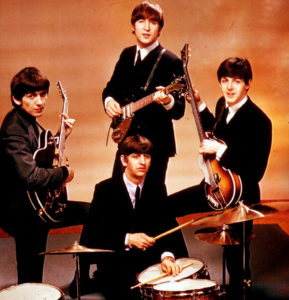 This is Billboard’s Hot 100 chart for April 4, 1964. All of the top five singles on the chart were recorded by the Beatles, along with seven other lower-ranked singles (plus two musical tributes to the group, “A Letter to the Beatles” and “We Love You Beatles”). At no time before or since has one group or solo artist dominated the pop-music charts so completely.
This is Billboard’s Hot 100 chart for April 4, 1964. All of the top five singles on the chart were recorded by the Beatles, along with seven other lower-ranked singles (plus two musical tributes to the group, “A Letter to the Beatles” and “We Love You Beatles”). At no time before or since has one group or solo artist dominated the pop-music charts so completely.
Just as interesting, though, is the fact that Louis Armstrong’s recording of “Hello, Dolly!” occupied the #7 slot on the chart that week. Five weeks later, it would knock “Can’t Buy Me Love” out of the top position, succumbing a week later to Mary Wells’ “My Guy.” Never again would a jazz record top the Billboard charts, and only one other show tune, “Aquarius/Let the Sunshine In,” has since gone all the way to #1.
These facts are striking enough as is. But a closer look at the April 4 chart reveals that it contains:
• No jazz records other than “Hello, Dolly!”
• Only one other record of a show tune, Barbra Streisand’s “People,” all the way down at #100
• Only three other “standards” singers, Al Martino at #23 (with a pseudo-country tune), Jack Jones at #62, and Gloria Lynne at #82 with “I Should Care,” written in 1944
• Only one record by a big band, Sammy Kaye’s rock-flavored Muzak-style version of Henry Mancini’s “Charade,” at #89
In their place are the Beach Boys, the Dave Clark Five, the Four Seasons, Jan and Dean, Lesley Gore, Elvis Presley, and Bobby Vinton.
 Not only were jazz and golden-age standards no longer a significant part of the American pop-music scene in 1964, but every other musical style had been pushed into the shadows by the rise of rock. Look at the chart and you will see:
Not only were jazz and golden-age standards no longer a significant part of the American pop-music scene in 1964, but every other musical style had been pushed into the shadows by the rise of rock. Look at the chart and you will see:
• One folk group, Peter, Paul & Mary at #33
• Two country singers, Johnny Cash at #43 and Johnny Tillotson at #54
• Two quasi-country instrumental novelties, Pete Drake’s “Forever” at #44 and Boots Randolph’s “Hey, Mr. Sax Man” at #99
• Four non-rock pop instrumentals, Al Hirt’s “Java” at #18, Robert Maxwell’s “Shangri-La” at #60, Henry Mancini’s “Pink Panther Theme” (a genuinely jazzy record with a tenor-sax solo by Plas Johnson) at #80, and Herb Alpert’s “Mexican Drummer Man” at #91
• One R&B instrumental, King Curtis’ “Soul Serenade” at #86
And what of black pop music? Well, you’ll find Ray Charles, Marvin Gaye, Mary Wells, Otis Redding, the Temptations, and “Little Stevie Wonder” (as he was known in his youth) on the April 4 Hot 100 chart, plus a fair number of records by such vocal groups as the Coasters, the Contours, the Impressions, the Marvelettes, the Miracles, the Raindrops, the Ronettes, and the Shirelles. But nearly all of these records are on the bottom half of the chart, which suggests that they were mostly being bought by black listeners in 1964, in much the same way that the now-legendary “race” records of the Twenties were largely unknown to white listeners. And it is just as noteworthy that only two blues records, Bobby “Blue” Bland’s “Ain’t Nothing You Can Do” and B.B. King’s “How Blue Can You Get,” made it onto the chart.
 The Beatles were not responsible for this transformation. The Hot 100 charts for 1959 were broadly similar-looking, if not quite so stylistically homogenous. The juggernaut of rock had rolled over and flattened out the American musical landscape well before the Beatles came along. But their colossal success, in addition to ratifying the triumph of rock, is yet another indication that America still had a common culture in 1964. To glance at the April 4 Hot 100 chart is to be left in no possible doubt that pretty much everybody in America was listening to the Beatles that week, just as pretty much everybody was watching The Beverly Hillbillies and Bonanza on TV.
The Beatles were not responsible for this transformation. The Hot 100 charts for 1959 were broadly similar-looking, if not quite so stylistically homogenous. The juggernaut of rock had rolled over and flattened out the American musical landscape well before the Beatles came along. But their colossal success, in addition to ratifying the triumph of rock, is yet another indication that America still had a common culture in 1964. To glance at the April 4 Hot 100 chart is to be left in no possible doubt that pretty much everybody in America was listening to the Beatles that week, just as pretty much everybody was watching The Beverly Hillbillies and Bonanza on TV.
For better and worse, we were all on the same page in 1964, the year in which Philip Larkin wrote “MCMXIV,” a poem about what England had been like fifty years earlier, on the eve of World War I:
Never such innocence,
Never before or since,
As changed itself to past
Without a word—the men
Leaving the gardens tidy,
The thousands of marriages,
Lasting a little while longer:
Never such innocence again.
* * *
The Beatles perform “Twist and Shout” on The Ed Sullivan Show on February 23, 1964. The song, recorded on February 11 and released as a single in the U.S. on March 2, reached #2 on Billboard’s Hot 100 chart on April 4:
